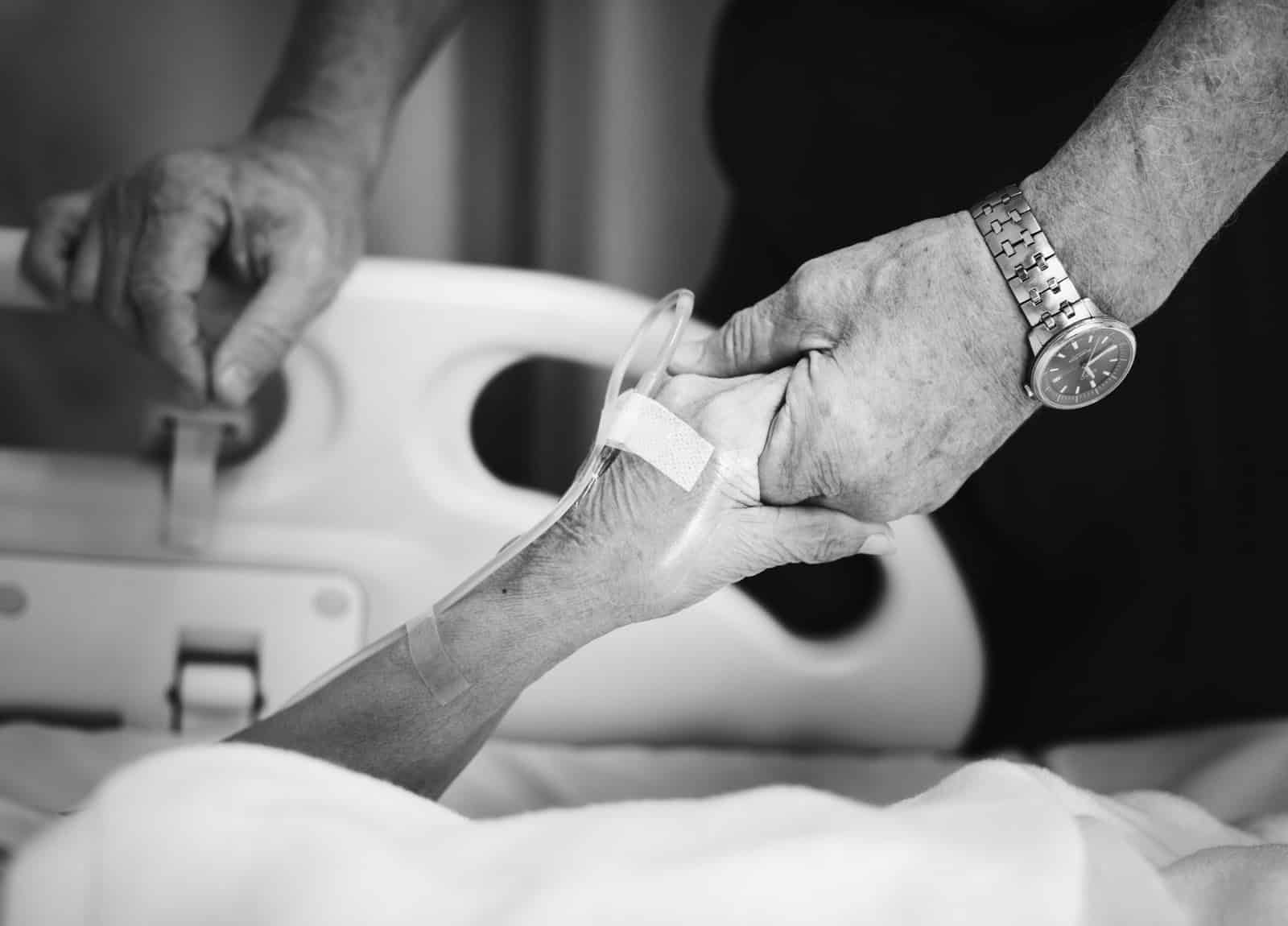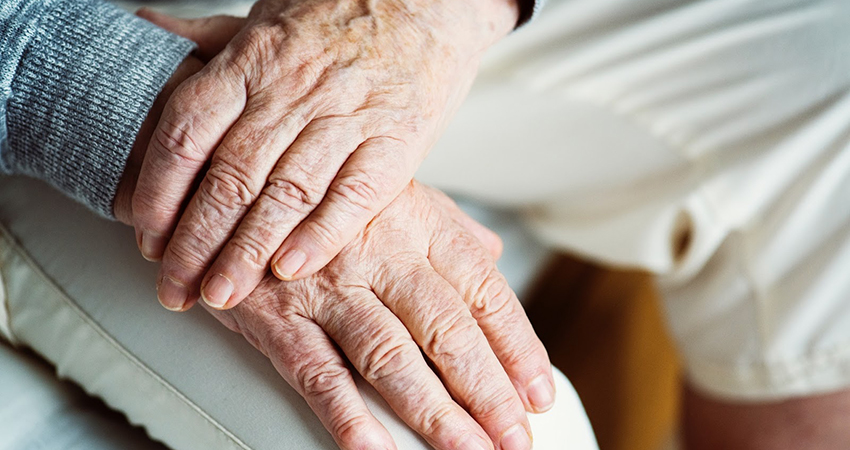What to say to someone who is dying

As a family caregiver, end-of-life care can be full of emotion. Not only do you have to deal with your own grief while handling the details of your mom or dad’s final days, you might also be considering your own mortality.
When the time comes to talk to a dying person about death, it’s best to be prepared as best you can. The reality is that you can never be fully prepared when dealing with something so life changing. But you can still take steps to help you feel less overwhelmed and hopefully allow yourself to be present with your parent.
Having some idea of what to say and how to say it will help you express your empathy and compassion, acknowledge your mom or dad’s feelings, and let them know you’re there to help.
So, what can you say to your beloved parent who is dying? And are there certain things you may want to avoid saying? Let’s take a look at some recommendations on what to say to your mom or dad and how to make sure you’re caring for yourself during this most difficult time.
What to Say to Someone Who Is Dying
Trying to find the “right words” when talking to anyone who is dying — especially your own parent — can be riddled with anxiety, anger, fear, frustration, and heart-breaking sadness. But death is a part of life that all of us will have to face at one point or another. This doesn’t make the whole situation any easier, but it helps to put things in perspective. What’s more, knowing what to say and how to say it can help you get through such a difficult and emotional time.
Of course, you’ll want to be gentle with any loved one who is dying. But you also want to remember to be gentle with yourself. Don’t worry about not knowing the so-called right thing or wrong thing to say. Oftentimes there’s no need to rehearse sincere words coming from your heart.
Still, being the caring person you are, you want to feel as empowered as possible. Here are four things to keep in mind when considering what to say to someone who is dying.
Don’t Dance Around It
The first step is to be open and honest about the fact that your family member is dying. If your mom and dad have already discussed and created an advance care plan, then you’ll have a clear idea of how to ensure their needs and wishes are met for end-of-life care. If they haven’t already had this discussion with you, now is the time.
Don’t dance around the fact that mom or dad is dying. Be truthful about it, even if feels unbearably painful. It’s completely normal if the dying person doesn’t want to talk about it —some do and some don’t. Many people who are at the end of their lives want to talk about it and it’s the people around them who try to avoid the topic. But it’s important that you are clear with others around you — other family members, friends, nurses or palliative care specialists, etc.
In situations like these, there isn’t necessarily a right or wrong thing to say. Perhaps the only wrong thing you can say is nothing at all. Staying silent and not talking doesn’t help anyone.
Listen First, Then Talk
You’ll want to be transparent and sincere in your communication when talking with your dying parent, but that doesn’t mean that you should be barging in to start these conversations. While you can let the dying person take the lead, oftentimes medical professionals will bring it up. It also isn’t “wrong” for the kids to initiate the discussion.
Listen to your mom or dad first before deciding what to say and continuing the conversation. Maybe your parent wants to face their impending death head-on, while others would prefer not to talk about it at all.
Some want to discuss things like hospice care, funeral arrangements, or new symptoms that have appeared, while others don’t. Actively listening and responding appropriately is your best course of action.
Make It Clear That You’re There for Them
As mentioned above, not saying anything — even in these most heart-wrenching times — won’t help the situation. It won’t make the reality go away, no matter how much you might want it to. It’s very important to let the dying person know that you are there for their needs as long as you can fulfill them.
Some people facing death are comforted by the “little things,” like having their home tidied up or listening to their favorite music. Some like to know that end-of-life needs are taken care of, such as financial considerations or funeral arrangements. And some people just like to know that their family members are physically there to be with them.
Again, listening to your parent and responding based on what they’re thinking and feeling is the best course of action. Just make sure your mom or dad knows you’re available for them in whatever way they need.
Say “I Love You”
According to Dr. Ira Byock, author of Four Things That Matter Most, it’s never too late to say “I love you” in any relationship. Even if you’re not the type to say it to your parent, it’s a good idea to say it now.
Morbid as it may seem, approach every “goodbye” as though it might be the last time you say it. Because the truth is, it might be. You might regret it if you say something like “See you soon” and then don’t get a chance to say a proper goodbye. That’s why telling mom and dad that you love them is so important.
Encourage mom or dad to share their favorite memories or fun stories about their life. Sharing the most special moments and memories of their lives is a powerful way to celebrate what a wonderful life they’ve lived, and it can remind them of their immense impact on their loved ones.
What Not to Say
We’ve seen how important it is to be straightforward yet compassionate during someone’s final days. But there are always a few things that are best to avoid saying as your parent enters into the dying process.
- Don’t give false assurances. It might be easy to resort to cliches like “You’ll be fine” or “It’s going to be OK” to try and make the person feel better (or make yourself feel better). But you’re avoiding the truth. You can be honest while still being gentle and uplifting.This is especially important for cancer patients and those dealing with serious terminal illness.
- Don’t overwhelm the dying person with your own grief. Be clear about how you’re feeling, but you don’t want to be asking your mom or dad to be taking care of your feelings and trying to make you feel better. It’s reasonable that you express your feelings, including how much you are going to miss them, which is lovingly indicating the impact their life has had.
- Don’t fill the silence with words. Sometimes, there might be a pause or a moment of silence during a conversation. Resist the urge to immediately start talking in order to fill the silence. Your mother or father might be very comforted just by being there with you physically, without you even having to say a thing.
Care for Yourself, Too
Dealing with your parent’s end-of-life care can prove extremely taxing in all sorts of ways. That’s why it’s essential as a family caregiver to take care of yourself, not only your dying family member.
Be sure to tend to yourself physically and mentally, as well as emotionally. Talk to others who have been through the experience of losing a parent. Be open about your feelings, and don’t be afraid to let yourself grieve.
Surround yourself with things that bring you joy, no matter how simple. It could be a comfortable sweater, a favorite book, or your beloved pet. Do your best to get some physical activity, and get some fresh air out in nature when you have the chance — it can have some genuine healing benefits.
It’s easy to think that you must only focus on how your parent is feeling, and ignore or not express your own emotions, but that’s not true. In fact, bottling up your emotions will do far more harm than good. Expressing them, on the other hand, is completely normal, appropriate, and healthy.
How Do You Know What to Say to Someone Who Is Dying?

Talking to your parent during their end-of-life stage is going to be filled with emotions. You may feel overwhelmed, sad, angry, full of love, grateful, and a host of other emotions. But know that you’re not alone. While it won’t be easy, following a few basic guidelines can help.
Let your mom or dad lead conversations and listen to what they’re saying. Simply letting the person know that you’re there to help and that you love and appreciate them can be enough for the moment.
Taking time to care for yourself during this difficult time is also key. You won’t be any good to your parent or other loved ones if you’re unhealthy — physically, mentally, emotionally, or otherwise. Make sure to confide in a close friend, another family member, a spiritual advisor (if that’s your preference), or a support group whenever you need to. That way, you can be of the most help to your parent during their final days.
What advice do you have for speaking to someone who is dying, especially a parent? How did you get through the experience? We would love to hear your personal stories.









My mum only has days left I’m struggling to come to terms with this she has cancer through smocking
She’s only 6 stone her body is a shock as she’s just bones
I love her so much I don’t no if I can handle the end x
Hi Jenine,
Please reach out for help–family, friends, health care professionals. You don’t need to go through this tremendously difficult time all on your own. Please take good care.
My mum is 90, she lived in England during WWII and was bombed out of house twice, she lived in Plymouth which was a big naval base back then and suffered many attacks from the Germans in France. My parents and I left England in 1952 to start a new life in America, my mum is a fighter as I am. Family has always been a big part of my life, I remember when she was pregnant with my sister I would wash the kitchen floor for her, and now I am doing all I can for her, it’s been hard on my marriage but my mum has always be there for me and I promised my dad I would take care of her. It’s hard seeing her so defenseless now but I am there till the end of the line cuz that is what she taught me, stiff upper lip!
Hi Scottie,
Thanks for sharing. We have started a series on Elizz called ‘Caring Lives’. I would love to have a conversation with you about you caring for your mum. If you are willing, just email me at: janevock@sehc.com.
My father is 87. He has end stage renal failure and has been on dialysis for two years. Last year, he caught COVID, which severely scarred his lungs, making it difficult to even walk across the room. Since then, he has had pneumonia several times, a heart attack and a pacemaker put in.
Through all that, he has survived. But he has grown severely weak and is prone to falling. Last night he told my mother that he thinks he’s dying.
I live about 3 hours away, but have spent most of the past year here with my parents. Thank you for this article. It has provided me with some advice on how to handle this very sad and difficult time.
Hi Chris,
Thank you so much for sharing. It is clear that your father (and mother) are most fortunate to have you in their life. Your commitment and love shines through. Please do take good care, Jane
My Mom just told me today that she feels like dying. Like she keeps on telling me the same phrases for a week now and I tried to avoid it. But at the end of the day, I can’t help but to cry in silence. My Dad just died last month and I don’t think I can handle anything more if I lose Mom, too.
Hi Yara,
It sounds like you Mom is in a great deal of pain. I wonder if she would be willing to see her doctor. You can tell her you are concerned about her. And I understand you are worried about your Mom and need space to grieve the death of your father. Please consider reaching out for yourself to get support in your grieving.